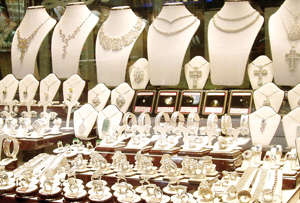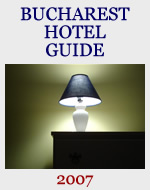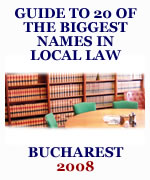Harsh tax regime promotes black market in jewels
High taxes and tough regulations are forcing pressure on retailers in the gold accessories sector, finds Corina Ilie
 |
|
|||||||||||||
Romania is encouraging the illegal import of all gold accessories, such as diamond rings, through a harsh tax regime and tough regulations which have seen 64 per cent of retailers hit with fines in one year.
In Romania, importing gold accessories entails a 15 per cent tax excise duty. All EU countries have dropped a similar excise duty, except for Latvia, where it is five per cent.
This encourages consumers to choose to buy accessories on the black market, which last year accounted for 85 per cent of the entire sales of jewels.
“EU countries eliminated the excise tax because they realised that gold reserves contribute to the economic stability of a country,” says Mihail Pacioianu, first vice-president of Precious Metals and Precious and Semi-precious Stones Federation ‘Diamond Gold’. “If the excise tax was eliminated, half of Romania’s black market in gold accessories would disappear.”
Last year the excise was 25 per cent and the Government promised to reduce it gradually by 2010, when it will eventually be eliminated. By then, the state’s budget will have lost around 100 million Euro every year, argues the previous metals federation.
The two year gap also gives time for the black market to put its house in order and adapt to the new rules, once they come into play in 2010.
'1') {
require('php/art_auth.inc');
}
?>The Academy of Economic Studies and the Applied Economy Group (GEA) have made studies which reveal the negative impact of the excise tax on jewels on Romania’s economy, which they forwarded to the Ministry of Economy and Finance. “We asked the Government to eliminate the excise, but their reply was that there was no political will to cut this tax yet,” says Karl Heinz, president of the Association of the Jewellers in Romania (PBR).
Importers do not have to pay any customs taxes for jewels coming from any EU countries or Turkey, according to a bilateral agreement concluded between the two countries, but for other countries such as Russia and Ukraine taxes can reach up to 30 per cent of the product’s price.
Around 16 tonnes of gold jewels and 80 to 100 tonnes of silver jewels were sold in 2007 on the Romanian market, according to data provided by Mihail Pacioianu.
“If around one tonne of gold jewels is sold in Romania every month this means that each Romanian buys around 0.045 grams of gold every month, which is a very low quantity and I find it hard to believe this is a real figure,” says Karl Heinz.
Except for smugglers, pawnbrokers are also exempt from the payment of excise taxes. “There are pawnbrokers that only accept new jewels from customers, so it is more profitable to set up a business as a pawnbroker than to sell jewels on the regulated market,” Heinz adds.
Turkey is the biggest exporter of gold accessories to Romania with 70 per cent of total imports, followed by Italy, China, UK, Germany, France and Spain.
There were around 5,000 companies on the market including producers and merchants in Romania last year. Since 2004, around 600 new operators have entered the market, according to data provided by the Precious Metals and Stones Division in the National Authority for Consumer Protection (ANPC). But president of PBR Karl Heinz claims that many of them are considering closing because of the high taxes and the entangled legislation.
Majority of retailers fined
The precious metal stones division has penalised 64 per cent of the operators its officers have checked in one year alone.
From its investigations, the Precious Metals and Stones Division in the National Authority for Consumer Protection (ANPC) issued penalties worth a total of 185,000 Euro to 553 of 869 retailers under examination. The department also confiscated 9,775 kilogrammes of gold objects, although, when melted down, 15 per cent of this figure proved to be non-precious metals.
Operators sometimes do not understand the penalties they receive from ANPC. Marius Mandaianu, who runs a jewellery shop in Sighisoara, was shocked at the behaviour of the authorities when they visited his store last October.
“They found among the gold jewels three items of gold weighing two grams each, which did not carry an official stamp on the back, because they were too small and I was afraid to damage them,” says Mandaianu. “They confiscated the items and I had to pay a 608 Euro penalty. One month later I received an order from ANPC forcing me to suspend all activity in my shop for six months.”
According to the Government decree from 2000 on precious metals, it is illegal to exhibit or sell precious metals that are not marked. Operators which do not respect this law have to pay penalties of 600 to 1,200 Euro. ANPC also has the power to confiscate the unmarked objects.
When Mandaianu signed an agreement about the irregularities in his operations, he did not consent to the suspension of his operations. Mandaianu claims the ANPC added this clause later to the same documents.
“ANPC may be entitled to suspend the license for one to six months,” says Mandaianu. “But the big question is: on what grounds do they do that? Why don’t they mention the penalties for each contravention and the allowed quantity of unmarked gold items?” He says that ANPC is guilty of an abuse in this case.
“The law is very clear,” says Gheorghe Ciubotaru, state under-secretary and vice-president of ANPC. “All gold objects must be marked, there is no exception. These operators deserve their penalties because we cannot be sure how many unmarked objects they sold before we caught them.”
Price of ice
Romanian consumers understand little about the quality of precious stones. When they are shopping in luxury outlets for an engagement present or a pair of earrings, there are two criteria that rule: it has to be diamond and the rock must be big.
Coloured stones such as rubies, emeralds and sapphires are avoided because they remind of traditional types of jewels which are now out of fashion.
Diamond rings are the best selling items among jewels with precious stones in Romania. But many of the diamonds on the market are either too small or have low quality such as poor colouration and bad cuts.
“There is a huge lack of culture on the precious stone market,” says Oana Ceciu, gemologist at Diamandis Center. “Romanians look for jewels with big diamonds and do not realise that a smaller diamond can be more valuable through colour and shape and therefore more expensive.”
The most valuable diamonds are colourless. The colour scale starts from colourless D, which is the most valuable diamond and goes up to yellow Z, which is the least valuable diamond. There are diamonds which are beyond the Z category which include coloured diamonds such as black, red, green or blue and they are usually more expensive at prices that can reach millions of Euro, than colourless diamonds.
Operators who sell jewels with fake stones can get caught, but only if the customer decides to go to the laboratories of the National Bank of Romania and ask for validation.
There are special devices that produce a certain sound when placed on diamonds and the same sound when placed on a synthetic imitation of the diamond. “There are a lot of people who spend a lot of money on jewels with fake stones,” says Ceciu.

















